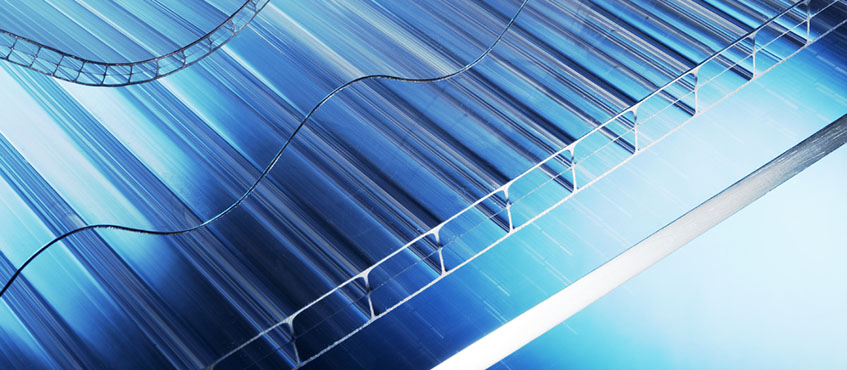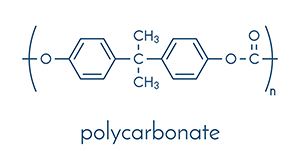Polycarbonate is a clear thermoplastic containing carbonate groups in its chemical structure. It is one of the most widely used engineering thermoplastics due to its excellent impact strength, its optical clarity and its wide working temperature range.

Polycarbonate is chosen for applications where strength and impact resistance are of key importance yet the material has to be lightweight, when transparency is needed and when a non-conductive material with good electrical insulation is a requirement.
Brett Martin’s Marlon range encompasses flat polycarbonate sheet, corrugated sheet and multiwall sheet for glazing, roofing and fabrication.
 Polycarbonate is composed of bisphenol A connected by carbonate-linkages in its backbone chain. Bisphenol A contributes to polycarbonate’s strength and also its inability to crystallise.
Polycarbonate is composed of bisphenol A connected by carbonate-linkages in its backbone chain. Bisphenol A contributes to polycarbonate’s strength and also its inability to crystallise.
Polycarbonate pellets are melted and then shaped by either extrusion or moulding.
Extrusion
Molten polycarbonate is passed through a die then cooled rapidly to form it into sheets.
Moulding
Melted polycarbonate is pressed into a mould to shape it for the final product. The melt is then cooled inside the mould. This process is ideal for specific parts such as automotive and computer parts.- High strength making it resistant to impact and fracture
- High heat resistance, making it ideal for applications that require sterilisation
- Good dimensional stability which permits it to retain its shape in a range of conditions
- Good electrical insulation properties
- Biologically inert and readily recyclable
- Excellent processability
- Transparency and optical clarity
- Easily coloured
Brett Martin’s polycarbonate products are sold under the Marlon brand:
Brett Martin’s polycarbonate products have a long life expectancy and are expected to last and be used for years. Many applications even help to save resources, such as light weight polycarbonate containers that reduce fuel consumption during transport, lightweight and aerodynamic automotive parts that reduce fuel consumption, and multi-wall sheets which are heat insulating and contribute to energy savings.
At the end of a polycarbonate product´s life it can be recovered, recycled or disposed of safely.
Plastics Industry Websites
- British Plastics Federation www.bpf.co.uk
- The Plastics Portal www.plasticseurope.org
- EPSE www.epse.org
Plastics Industry Associations
- European Plastic Distributors Association www.epda.com
- International Association of Plastics Distributors www.iapd.org
Polycarbonate Roofing Associations
- National Federation of Roofing contractors www.nfrc.co.uk
- Metal Cladding & Roofing Manufactures Association www.mcrma.co.uk
